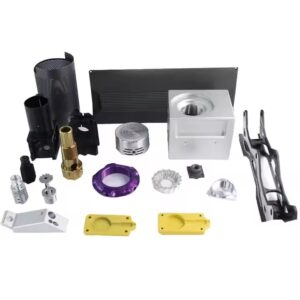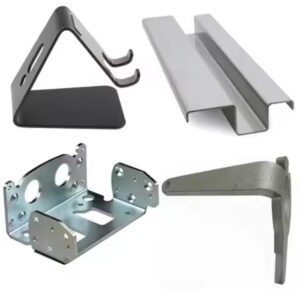Today, I want to talk about something we deal with a lot in our factory—metal components and their critical role in the industrial control (or “industrial automation”) sector. If you’re working in this space, you already know that reliability, precision, and durability are non-negotiable. Let’s break down how metal parts are making industrial control equipment tougher, more efficient, and built to last.
1. Enclosures and Housings: Protection Matters
One of the most visible applications of metal components in industrial control is in enclosures and housings. You’ve got control units, PLCs (Programmable Logic Controllers), and HMIs (Human-Machine Interfaces) that need to withstand tough environments—whether it’s dust, moisture, or extreme heat. That’s where metal enclosures come in.
- Stainless Steel Enclosures
Stainless steel enclosures are a staple in industries like food and beverage, chemical processing, and pharmaceuticals because they resist corrosion and can withstand regular washdowns. Plus, they’re tough enough to handle impacts and keep sensitive electronics safe. - Aluminum Enclosures
For industries that need something lighter but still durable, aluminum is a popular choice. It’s corrosion-resistant, easy to machine, and offers excellent protection against electromagnetic interference (EMI)—a big deal in control systems. - Custom Metal Housings
We’ve done custom fabrication for enclosures in environments that are extra harsh, like oil rigs or mining operations. In these cases, it’s all about finding the right balance between strength and weight, and using the right protective coatings to extend service life.
2. Structural Components: Backbone of Industrial Machinery
In industrial control systems, precision is everything. Many of the structural components—the frames, brackets, and mounting systems—are made from metal for this very reason. These aren’t just supporting parts; they have to hold industrial machinery stable while dealing with continuous vibrations, high pressure, and heat.
- Mounting Brackets for Sensors and Actuators
Metal brackets are used to hold sensors, actuators, and other control equipment in place. These can’t afford to fail, especially in high-speed production lines or critical automation systems. Stainless steel and high-grade aluminum are often used because they provide the strength needed to keep everything in perfect alignment. - Machine Frames
We’ve fabricated custom metal machine frames for manufacturers who need their control systems to be rock solid. These frames often support weighty equipment like motors, compressors, or industrial pumps, so the materials have to be robust. Making sure everything is square and level ensures the entire system runs smoothly and efficiently.
3. Heat Sinks and Cooling Systems: Managing Heat
Industrial control systems generate heat—sometimes a lot of it. Metal components are key in managing this heat to ensure the systems run smoothly without overheating. Heat management isn’t just a “nice to have” here; it’s mission-critical.
- Aluminum Heat Sinks
Aluminum is commonly used for heat sinks in industrial control systems because it’s lightweight, cost-effective, and has good thermal conductivity. Whether it’s in power supply units or motor controllers, these heat sinks help dissipate heat, preventing system failures. - Copper Cooling Components
For systems that need even greater heat management—like heavy-duty transformers or high-power inverters—copper cooling plates and components are often used. Copper’s high thermal conductivity makes it a go-to choice when cooling efficiency is a top priority.
4. Electrical Conductivity: Wiring and Busbars
Let’s not forget that many metal components inside industrial control systems serve electrical purposes. Metal parts like busbars and connectors are critical for conducting electricity efficiently and safely.
- Copper Busbars
Copper is the preferred choice for busbars due to its excellent electrical conductivity and durability. In industrial control panels, copper busbars route electrical power between different components. They have to be precisely cut, drilled, and bent to fit into tight spaces, and that’s where custom copper fabrication comes into play. - Aluminum Wiring
In some cases, aluminum wiring and connectors are used, especially when weight and cost savings are essential, although copper is still the main player in most heavy-duty industrial applications.
5. Custom Metal Components for Specialized Equipment
In the industrial control industry, one size rarely fits all. Over the years, we’ve worked closely with equipment manufacturers and engineers to create custom metal components that meet specific needs. The beauty of metal fabrication is that it can be tailored to provide exact solutions.
- Custom Sensor Housings
We’ve fabricated custom housings for specialized sensors that need to withstand both high pressure and corrosive environments. These sensors play a crucial role in controlling industrial machinery, and any failure in their housing could mean costly downtime. - Custom Mounting Systems for Motors and Drives
We’ve also built custom mounting frameworks that hold large industrial motors and drives in place. These mounts are designed specifically to dampen vibrations and reduce wear, which is essential for high-precision operations like CNC machining or automated assembly lines.
Conclusion
So, what’s the takeaway? Metal components are absolutely foundational to the industrial control systems that keep factories, plants, and production lines running smoothly. They provide the durability, electrical conductivity, heat resistance, and structural integrity that these systems need to operate 24/7, often under extreme conditions.
At our factory, we’ve had the privilege of partnering with some of the biggest names in industrial automation, delivering custom metal solutions that keep their systems running at peak performance. Whether it’s a simple metal bracket or a custom-engineered enclosure, we know that the smallest metal part can have the biggest impact when it comes to reliability and efficiency.
If you’ve got a project that requires tough, precision-engineered metal components, give us a shout. We’re always ready to jump in and help you build the systems that keep the world turning.
Until next time, stay strong and keep innovating!




